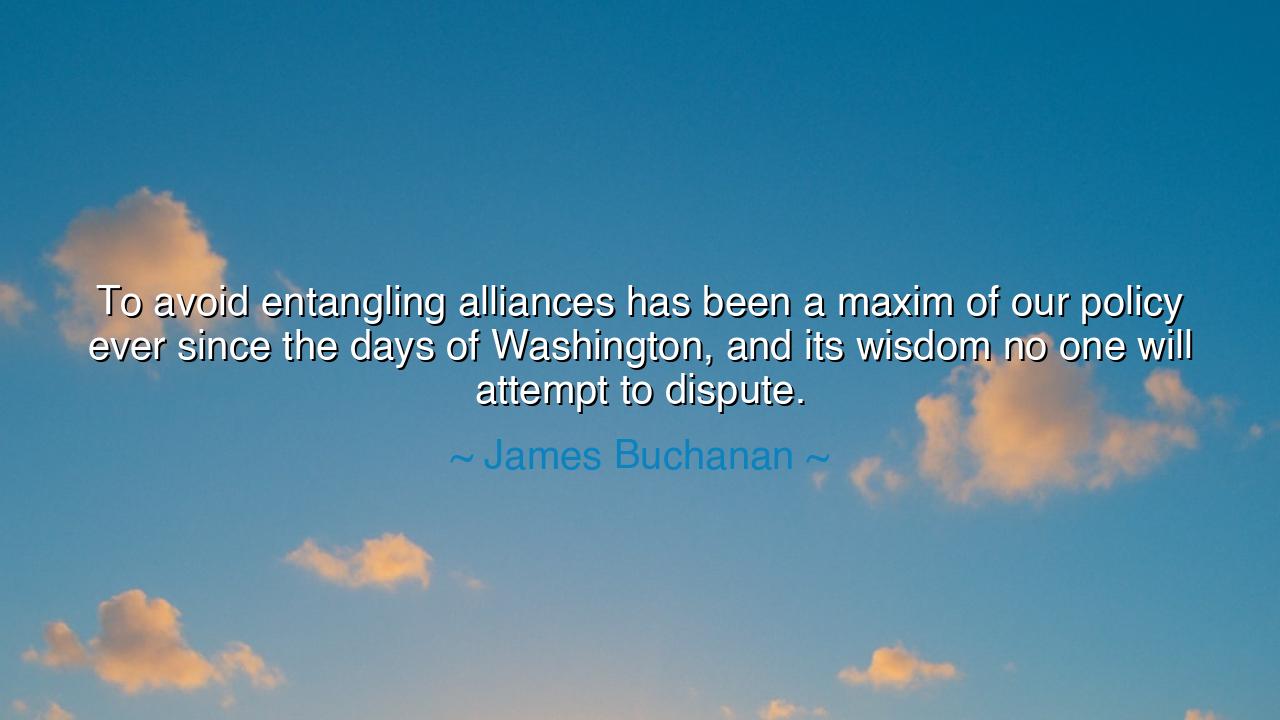
To avoid entangling alliances has been a maxim of our policy
To avoid entangling alliances has been a maxim of our policy ever since the days of Washington, and its wisdom no one will attempt to dispute.






Hear me, O children of the future, for I speak of a wisdom passed down through the ages, a truth that has shaped the very course of nations. James Buchanan reminds us: "To avoid entangling alliances has been a maxim of our policy ever since the days of Washington, and its wisdom no one will attempt to dispute." These words, like a sacred teaching, echo the guidance of the Founding Fathers who understood the dangers of being drawn into the webs of foreign entanglements. To remain true to freedom, to independence, and to the spirit of self-determination, a nation must be cautious of alliances that may cloud its judgment and draw it into conflicts not of its making.
In the early days of the Republic, George Washington himself, in his Farewell Address, warned against the dangers of foreign alliances that could entrap the fledgling nation in the struggles of distant lands. He saw that the strength of America lay not in its ability to fight wars far from its shores, but in its ability to remain united, neutral, and focused on its own destiny. Washington’s wisdom was rooted in the belief that the future of the United States should not be dictated by the interests of foreign powers, but by its own aspirations and the will of its people.
Throughout history, we have witnessed the consequences of nations failing to heed such warnings. World War I serves as a sobering example. European powers, caught in the intricate web of alliances, were drawn into a devastating conflict after the assassination of Archduke Franz Ferdinand. What began as a regional dispute quickly escalated into a global war because the countries involved were bound by complex treaties and mutual obligations. The United States, though initially reluctant, was eventually pulled into this conflict, despite Washington’s original counsel to avoid such entanglements. This conflict, and the destruction it caused, serves as a reminder of the wisdom of avoiding alliances that may force a nation into wars not of its own choosing.
Consider, too, the Cold War that followed World War II. The United States found itself in a fierce ideological struggle with the Soviet Union, drawn into conflicts far from its shores in places like Korea and Vietnam. These conflicts, though fueled by the belief in freedom and democracy, often seemed more like the result of an entangled web of global interests rather than any direct threat to the security of the American people. The wisdom of Washington’s advice was again evident, for in many of these conflicts, the United States found itself entangled in struggles that drained its resources and divided its people.
So, O children, let this lesson guide you: The wisdom of Washington and Buchanan is not to be taken lightly. Entangling alliances, while sometimes necessary, must be entered into with great caution, for they can lead a nation astray, pulling it into wars, conflicts, and struggles that are not of its own making. True strength lies not in the alliances we form, but in our ability to stand as a nation with a clear purpose, focused on the principles of peace and self-determination. May the lessons of the past guide you as you navigate the complexities of the future, and may you always seek the wisdom of independence and neutrality when faced with the temptation of foreign entanglements.






GDGold D.dragon
This quote invites reflection on the tension between isolationism and engagement. Could avoiding alliances create short-term clarity but long-term strategic disadvantages? I’m also curious how this approach influenced U.S. foreign policy decisions before and after major international conflicts. Does the principle still hold value in a world dominated by multinational organizations, treaties, and global threats? It challenges me to consider how historical philosophies shape modern diplomatic strategy and national security priorities.
MMMin Min
I find myself questioning the assertion that the wisdom of this policy is undisputed. History is full of examples where alliances have both helped and complicated national objectives. Could rigid adherence to this principle prevent a nation from responding effectively to crises, like world wars or global economic challenges? It also makes me wonder about the criteria used to define an 'entangling alliance' and whether such judgments are subjective or guided by consistent principles.
TDDo Tien Dat
This perspective raises questions about the nature of sovereignty and trust. Could avoiding alliances foster self-reliance and clarity of policy, or does it risk alienating potential partners and reducing influence abroad? I’m curious whether there have been situations where alliances actually prevented conflicts and whether strict avoidance might have inadvertently caused harm. How do leaders determine when cooperation outweighs the dangers of entanglement?
UGUser Google
Reading this, I’m struck by the historical confidence in this approach. But is it wise to assume that what worked in Washington’s era can be applied uncritically to modern geopolitics? How much has the global landscape changed, and does technological and economic interdependence make avoiding alliances more difficult or even impossible? I also wonder how other nations interpret such a policy—does it signal strength, caution, or isolationism?
VAHuynh Van An
I find this statement both reassuring and concerning. While avoiding complex alliances might protect national autonomy, could it also leave a country vulnerable to global threats? How do we balance the desire for independence with the practical necessity of cooperation in defense, trade, and diplomacy? I also question whether this maxim assumes that all alliances inherently entangle, or if some partnerships could be carefully structured to minimize risk while maximizing benefits.